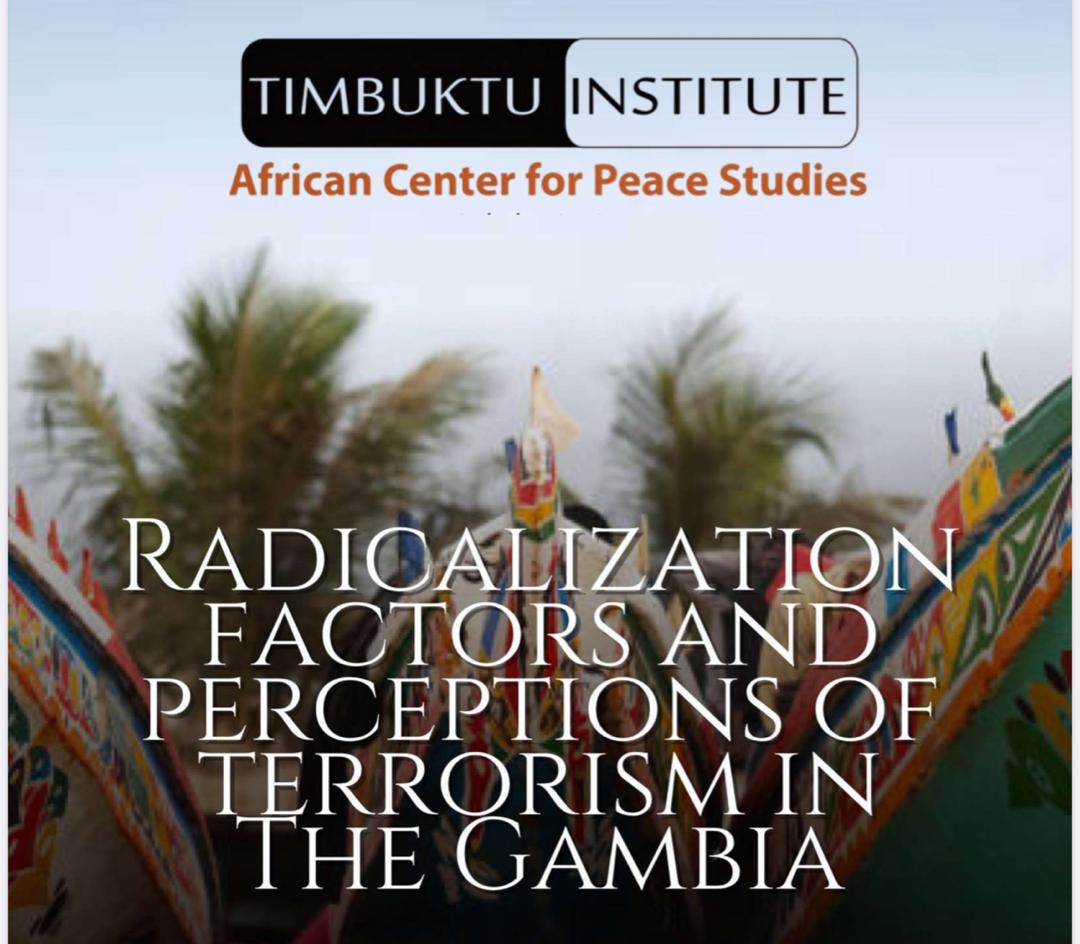By Timbuktu Institute – African Center for Peace Studies
The Timbuktu Institute’s report (June 2025) on radicalization factors and perceptions of terrorism in The Gambia provides a comprehensive analysis of the dynamics of violent extremism in this West African nation. Based on a mixed methodology combining quantitative and qualitative approaches, the report highlights emerging trends, key findings, and the strengths and weaknesses of The Gambia in combating radicalization. Below is a cohesive summary of these elements.
Major Trends
Optimistic Trends:
A Foundation of Cultural and Geographical Resilience: The Gambia stands out due to several strengths that mitigate the spread of violent extremism. Its geographical position, surrounded by Senegal, limits cross-border activities by extremist groups, providing a natural barrier against regional threats prevalent in the Sahel. This isolation is bolstered by historical and ongoing security cooperation with Senegal and ECOWAS, exemplified by interventions such as Operation Fodé Kaba in 1981 and the ECOWAS mission in 2017 to restore democratic order. Culturally, the peaceful coexistence between Muslims (including Ahmadis) and Christians, supported by the Supreme Islamic Council and the Christian Council, serves as a bulwark against religious tensions. The strong adherence of 78% of youth to Sufi Islam, perceived as moderate, enhances resilience against imported extremist ideologies. Furthermore, a significant majority of Gambians value peace, tolerance, and cultural diversity as protective factors against violent extremism. Effective interfaith dialogues, led by respected institutions, further reinforce this harmony, distinguishing The Gambia from more volatile Sahelian neighbors.
Mixed Trends: Slow but Concerning Radicalization:
While The Gambia remains relatively spared from violent extremism, mixed signals are emerging. Radicalization is progressing slowly, hindered by the limited penetration of extremist networks compared to other Sahelian countries. However, deviant behaviors among youth—such as political protests, criminal activities, and irregular migration attempts (“Barcelona or death”)—are seen as potential indicators of future radicalization risks. These behaviors reflect economic despair and frustration with marginalization, exacerbated by government corruption and a lack of opportunities. On gender equality, a slight majority believes in equality, but a significant portion perceives persistent inequalities, highlighting areas for improvement to strengthen social cohesion.
Concerning Trends: Growing Vulnerabilities
Despite its strengths, The Gambia faces significant challenges. High crime rates, coupled with the perceived ineffectiveness and corruption of security forces, fuel concerns about rising radicalization. The marginalization of youth, overlooked by the National Development Plan (NDP), increases their vulnerability, particularly through phenomena like irregular migration or violence. These marginalized youth, often involved in petty crimes, are at risk of being targeted by extremist actors exploiting their frustrations.
Another worrying trend is the rise in religious tensions, particularly between the Ahmadiyya community and Sunni scholars, fueled by hate speech from figures like Imam Fatty. These tensions threaten to erode the country’s traditional religious tolerance, potentially opening the door to religiously motivated radicalization. Additionally, the near-total absence of awareness about anti-extremism initiatives (99% of respondents unaware) represents a critical strategic gap.
Key Findings
• Limited Understanding of Concepts: 61% of respondents struggle to differentiate between radicalization and violent extremism, underscoring the urgent need for public education campaigns to clarify these concepts.
• Drivers of Radicalization: Socioeconomic precarity (poverty, unemployment, social exclusion) is identified as the primary driver of radicalization, followed by indoctrination by foreign religious groups. Frustrations stemming from corruption and lack of economic opportunities amplify these risks.
• Resilience of Sufi Islam: The widespread adherence to Sufi Islam (78% of youth) and interfaith coexistence are major strengths, though emerging tensions between Islamic currents threaten this stability.
• Rejection of Extremist Grievances: 68% of respondents dismiss the legitimacy of extremist groups’ grievances, with a notable urban-rural divide (80% in urban areas vs. 59% in rural areas), likely due to better access to information in urban settings.
• Strategic Gap: The lack of visible government or civil society initiatives to counter extremism (99% of respondents unaware) highlights a critical need for proactive policies.
• Role of Key Actors: Religious leaders (85% trusted) and traditional leaders (71%) are pivotal in promoting peace, while civil society organizations play a crucial role in awareness and prevention efforts.
• International Cooperation: 80% of respondents favor international cooperation that supports local initiatives, with Senegal (54%) and ECOWAS as preferred partners.
Strengths of The Gambia against violent extremism:
• Adherence to Sufi Islam: The strong commitment of youth to Sufi Islam serves as a natural barrier against extremist ideologies.
• Interfaith and Intercultural Coexistence: Tolerance between Muslims, Christians, and ethnic groups, supported by respected religious institutions, fosters social stability.
• Favorable Geographical Position: Enclavement by Senegal and security partnerships with Senegal and ECOWAS reduce cross-border threats.
• Influence of Community Leaders: Highly trusted religious and traditional leaders are well-positioned to promote peace and counter radical narratives.
• Protective Cultural Values: The emphasis on peace, tolerance, and cultural diversity is a significant asset in preventing extremism.
Weaknesses of The Gambia
• Socioeconomic Precarity: High unemployment, poverty, and social exclusion, especially among youth, create vulnerabilities to radicalization.
• Ineffective Security Forces: Perceived as corrupt and unprofessional, security forces struggle to address crime and prevent extremism.
• Lack of Awareness and Initiatives: The absence of visible anti-extremism initiatives limits the country’s ability to anticipate and counter radicalization.
• Emerging Religious Tensions: Growing tensions between Ahmadis and Sunnis, fueled by hate speech, risk undermining religious cohesion.
• Youth Marginalization: The NDP’s neglect of youth priorities fuels frustration and susceptibility to radicalization.
• Irregular Migration: Economic despair drives youth to undertake dangerous migration attempts, creating a potential avenue for exploitation by extremist groups.
Recommendations for a Comprehensive Approach
To address these challenges, the Timbuktu Institute’s report proposes several recommendations:
• Public Awareness and Youth Engagement: Political and religious leaders should promote tolerance and individual rights, while civil society organizations intensify peace education programs targeting youth.
• Addressing Socioeconomic Needs: The government must invest in robust Technical and Vocational Education and Training (TVET) programs and create a competitive job market to integrate youth.
• Women’s Empowerment: Include women in national anti-radicalization strategies, in line with UN Security Council Resolution 1325.
• Strengthening Governance and Security: Enhance transparency and professionalism in security forces, improving their capacity to manage crime and irregular migration.
• Promoting Interfaith Dialogue: Support initiatives like those of Activista The Gambia to foster peaceful coexistence and counter hate speech.
• International Cooperation: Prioritize support for local initiatives through partnerships with Senegal, ECOWAS, and others, while strengthening judicial and security capacities.
Conclusion
The Gambia possesses strong cultural, religious, and geographical assets to resist radicalization and violent extremism, including its adherence to Sufi Islam, interfaith tolerance, and regional security partnerships. However, challenges such as socioeconomic precarity, ineffective security forces, and emerging religious tensions demand increased vigilance. A comprehensive approach, involving the government, community leaders, civil society, and international partners, is essential to bolster resilience and prevent the rise of extremism, preserving the peace and stability that define The Gambia. Enditem




